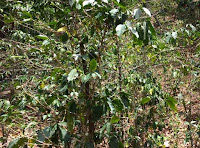If you look closely and apply a little imagination, you can see the illustration of a snake who has eaten an elephant. And that is the setting for Atitlan Organics farm in Tzunana. We are in one of the least populated areas surrounding Lake Atitlan. The lake is 5-6km north to south and 7-8km wide. We are surrounded by mountains as well as 3 large volcanoes to the north. On a clear day you can easily see Mt. Fuego in the distance smoking out it’s crescent top.
The weather around the lake varies more by altitude than area. Temperatures can get up to around 30'C in the day but near freezing at night up in the highlands. The lowlands where we are happen to be lovely. It's very comfortable, warm, not too humid and sometimes called - "the land if eternal spring".
When walking the path up to the farm one of the first things you cannot help but notice is that it is very rocky. This means the soil is going to be as well. The garden beds are going to need digging and sifting out of rocks in order to allow deep roots to form properly. You can see the simple two person sifter below.
The soil is loosened with a pick ax and scraped off to one side with a hoe. Some massive rocks were found and dug out with a long steel rod used as a lever. Once we dug down a little less than half a meter, we even out the bottom and pour on a layer of compost. The soil piled up on the side from the digging can then be sifted back into the trench. We then go along making even layers of sifted soil and compost and lightly mixing them together until we have a slightly raised bed.
The compost comes from the hen house under it’s straw bed. Just poke around for some soft spots with the pick ax and dig out a bag full of rich naturally fertilized soil.
We then cover the bed with mulch to ward off the harsh sun and encourage water retention and plant through the mulch.

This specific plot of beds we’ve been working on will eventually be sectioned off into 4 parts. Crops will be rotated through each section with one of them taking a 3 month break to allow smaller pigs to rummage around, dig around and fertilize the earth thus making for a great soil building system.
BONUS - Coffe and Goats

There are coffee plants all around the farm. They take about 3 years from first planting to start producing fruit. Most give yield for a good 10 years or more.
Here is a hand powered simple machine that separates the juicy outer shell from the bean inside. The shells are often left to rot in huge piles and sometimes even burned by local farmers (literally smells like an unkept outhouse). It's a shame because they are a perfect addition to any compost pile. They break down quickly and add a nice bit of moister.

Soak the shelled beans for a day and separate excess skin. Another rinse after that and they are ready for roasting.
I wonder if coffee and goat milk would be any good. Whatever, I take mine black.

Hi ...








No comments:
Post a Comment